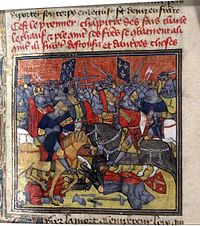Battle of Fontenay
| Battle of Fontenoy | |||||||
|---|---|---|---|---|---|---|---|
| Part of Carolingian Civil War | |||||||
 The battle as depicted in the fourteenth-century Grandes Chroniques de France. |
|||||||
|
|||||||
| Belligerents | |||||||
| Imperialists | Divisionists | ||||||
| Commanders and leaders | |||||||
| Lothar I, and King Pepin II of Aquitaine |
Charles the Bald, Louis the German |
||||||
| Strength | |||||||
| 150,000 | 150,000 | ||||||
| Casualties and losses | |||||||
| Unknown, but Agnellus of Ravenna stated that 40,000 died (Angellus, Liber pontifical, chap. 174, p. 390) | Unknown, but it can be assumed to be many thousands (Goldberg, Struggle for Empire, p 103) | ||||||
The three year Carolingian Civil War culminated in the decisive Battle of Fontenoy-en-Puisaye, also called the battle of Fontenoy, fought at Fontenoy, near Auxerre, on the 25 June 841. The war was the contention over the territorial inheritances —the division of the unified lands of Charlemagne's Carolingian Empire between his grandsons, the three surviving sons of Louis the Pious. Despite provisions by Louis the Pious, war broke out between his sons and nephews. It was a defeat for the allied forces of Lothair I of Italy and Pepin II of Aquitaine and a victory for Charles the Bald and Louis the German. While hostilities continued until another two years into 843, the Treaty of Verdun ending the war shaped and influences history in Europe even to this late modern date.
Louis the Pious throughout his long reign had entreated to divide his empire meritoriously amongst his sons—all his sons—as it was required by the Salic Law of the Franks. With the late-born Charles, his attempts led to civil wars which culminated in his vindicating defeat of his last rebellious son, Louis, in 839. At Worms, on 30 May that year, he divided his empire for the last time, giving Lothair the kingdom he already held (Italy) and the imperial title, with all the other lands of the east and Charles receiving all the lands of the west. Louis was left with Bavaria while Pepin, his grandson, was left out of the inheritance.
On 24 July 840 in Strasbourg, Lothair precipitated a new civil war by declaring his imperium over all the lands of the empire and, joining with his nephew Pepin, attacked the Loire Valley. The barons of Burgundy divided over allegiance to Charles and Lothair. Ermenaud III of Auxerre, Arnoul of Sens, and Audri of Autun pledged themselves for Lothair, while Guerin of Provence and Aubert of Avallon remained with Charles. Girard II, Count of Paris, Lothair's brother-in-law, joined Lothair also. In March 841, the Burgundians faithful to Charles accompanied Guerin to join him and in May, Louis of Bavaria and his troops met Charles army at Châlons-sur-Marne. In June, Pepin finally joined with Lothair in Auxerre.
...
Wikipedia
